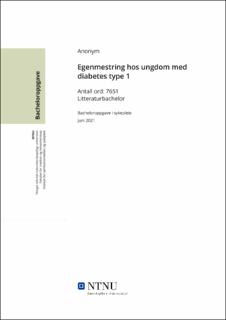| dc.contributor.advisor | Rangøy, Knut Arne | |
| dc.contributor.author | Fossberg, Hanna Åsheim | |
| dc.date.accessioned | 2021-09-25T16:25:42Z | |
| dc.date.available | 2021-09-25T16:25:42Z | |
| dc.date.issued | 2021 | |
| dc.identifier | no.ntnu:inspera:81643445:43252852 | |
| dc.identifier.uri | https://hdl.handle.net/11250/2782983 | |
| dc.description.abstract | Bakgrunn: Diabetes mellitus type 1 er en sykdom med økende forekomst. I Norge oppnår bare 29 prosent av ungdom med denne typen diabetes behandlingsmålet for sykdommen. Ungdom med diabetes står overfor en krevende oppgave når de skal bli selvstendige og må ta ansvar for diabetessykdommen. Sykepleieren spiller en sentral rolle i egenmestringen hos ungdom med diabetes type 1.
Hensikt: Hensikten med litteraturstudien er å se på sykepleierens rolle i samarbeidet mellom ungdommer med diabetes type 1 og deres foreldre. Oppgaven belyser hvordan sykepleieren kan bidra til utvikling av egenmestring hos ungdommer i overgangsfasen mot selvstendig håndtering av sykdommen.
Metode: Oppgaven er basert på en litteraturstudie, hvor det er tatt utgangspunkt i pensumlitteratur, faglitteratur og forskning. I tillegg er lovverk og sykepleieteoretikeren Dorothea Orem, inkludert for å svare på problemstillingen. Litteratursøkene er gjort i databasene Medline og Cinahl. Det er inkludert både kvalitative og kvantitative forskningsartikler.
Resultat: Ungdommene i de inkluderte studiene syntes at egenhåndtering av sykdommen var vanskelig. De beskrev et behov for mer kunnskap og informasjon om diabetes. I overgangen til å skulle ta selvstendig ansvar for diabetessykdommen opplevde ungdommene økt konflikt med foreldrene, og forverring av blodsukkerkontrollen. Balansen mellom foreldrenes involvering og oppfølging var vanskelig å finne. Sykepleieren var en viktig støttespiller for både ungdommene og foreldrene.
Konklusjon: Sykepleieren har en viktig rolle når ungdommene skal overta ansvaret for diabetesbehandlingen. Gjennom støtte og individuell tilpasset informasjon bidrar sykepleieren til utvikling av egenmestring. Foreldrene kan påvirke diabetesbehandlingen negativt. Sykepleieren må derfor støtte dem til å bli viktige ressurspersoner.
Nøkkelord: Diabetes mellitus type 1, ungdom, sykepleieutøvelse, samarbeid med foreldre, egenmestring | |
| dc.description.abstract | Background: Type 1 diabetes mellitus is a disease with a continues rise in incidence. Among adolescents in Norway with type 1 diabetes only 29 percent achieve the treatment goal for this disease. Adolescents with diabetes are faced with a challenging task in becoming independent and to take on the responsibility for their own care. The nurse’s role is central in insuring the adolescents’ self-efficacy.
Aim: The purpose of the study is to examine the nurse’s role in the cooperation among adolescents with type 1 diabetes and their parents. In this thesis, the nurse’s ability to provide and develop self-efficacy to adolescents during the transitioning phase of gaining self-responsibility in diabetes management, are presented.
Method: The thesis is a systematic literature study, which builds on curriculum-literature, academic literature and research articles. In addition, I have included legislation, as well as the nursing theorist Dorothea Orem. The search engines used to find the articles are Medline and Cinahl, in which both qualitative and quantitative research articles are included.
Results: The adolescents in the following studies shows that managing their diabetes was difficult and expressed a need for more knowledge and information. In the process of gaining self-responsibility of the disease, the adolescents experienced increased conflict with their parents and increased blood sugar levels. The balance of the parent’s involvement and managing was tough to find, thus making the nurse´s supportive role important in managing the adolescent and their parents in finding a collaborative approach.
Conclusion: The nurse has an important role when the adolescents are to take over responsibility of their diabetes treatment. Through support and customized information, the nurse contributes to the development of self-efficacy. The parents can negatively impact the outcome of the treatment. Therefore, the nurse must support them into becoming an important resource.
Key Words: Diabetes mellitus type 1, adolescents, nursing, cooperating with the parents, self-efficacy | |
| dc.language | nob | |
| dc.publisher | NTNU | |
| dc.title | Egenmestring hos ungdom med diabetes type 1 | |
| dc.type | Bachelor thesis | |
